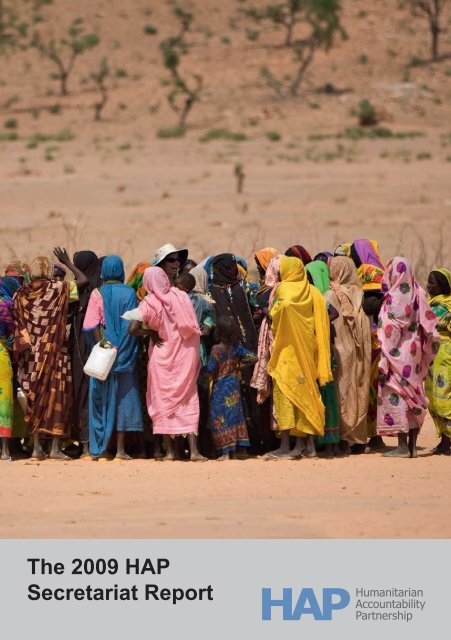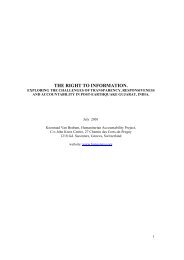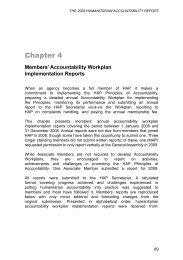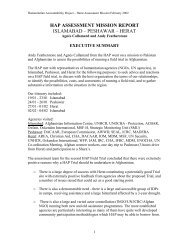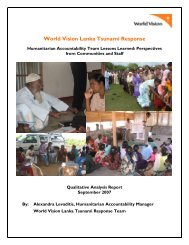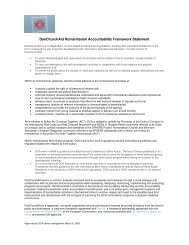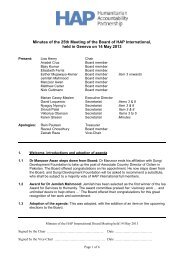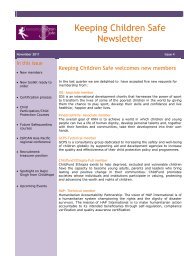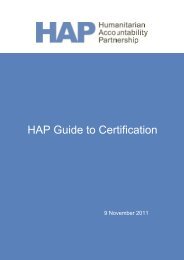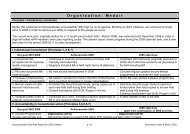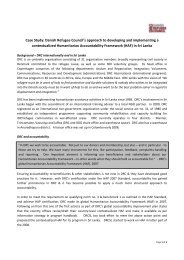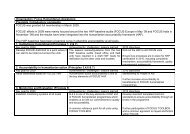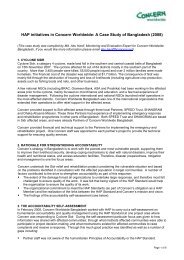The 2009 HAP Secretariat Report (r) - HAP International
The 2009 HAP Secretariat Report (r) - HAP International
The 2009 HAP Secretariat Report (r) - HAP International
You also want an ePaper? Increase the reach of your titles
YUMPU automatically turns print PDFs into web optimized ePapers that Google loves.
<strong>The</strong> <strong>2009</strong> <strong>HAP</strong><br />
<strong>Secretariat</strong> <strong>Report</strong><br />
<strong>HAP</strong> Humanitarian<br />
Accountability<br />
Partnership
Front cover:<br />
Women who fled fighting in eastern Chad gather in a camp for internally displaced<br />
people near Gos Beida June 6, <strong>2009</strong>. Refugees from conflict in Sudan’s Darfur and<br />
Chad appealed for more international protection so they can return to their homes.<br />
Photo: © REUTERS/ Finbarr O’Rielly
<strong>The</strong> <strong>2009</strong> <strong>HAP</strong><br />
<strong>Secretariat</strong> <strong>Report</strong><br />
THE <strong>2009</strong> <strong>HAP</strong> SECRETARIAT REPORT
Published by<br />
<strong>The</strong> Humanitarian Accountability Partnership <strong>International</strong><br />
Maison <strong>International</strong>e de l’Environnement 2 (First Floor, Room 1-08)<br />
Chemin de Balexert<br />
CH-1219 Châtelaine<br />
Genève<br />
Switzerland<br />
Tel: +41 22 788 1641<br />
Fax: +41 22 797 3861<br />
www.hapinternational.org<br />
© <strong>The</strong> Humanitarian Accountability Partnership <strong>International</strong><br />
2
THE <strong>2009</strong> <strong>HAP</strong> SECRETARIAT REPORT<br />
<strong>The</strong> <strong>2009</strong> <strong>HAP</strong><br />
<strong>Secretariat</strong> <strong>Report</strong><br />
Table of Contents<br />
List of Abbreviations 4<br />
Introduction 7<br />
I. Policy Services 9<br />
II. Development Services 23<br />
III. Regulatory Services 31<br />
IV. Governance and Management 37<br />
Annexe I <strong>HAP</strong> <strong>2009</strong> Audit <strong>Report</strong> and Accounts Summary 43<br />
Annexe II <strong>The</strong> <strong>2009</strong> <strong>Secretariat</strong> Workplan: Tabulated Results 51<br />
3
THE <strong>2009</strong> <strong>HAP</strong> SECRETARIAT REPORT<br />
List of Abbreviations<br />
ALNAP<br />
ATHA<br />
AWP<br />
BPRM<br />
BSO<br />
CAFOD<br />
CARB<br />
CDAC<br />
CERF<br />
CIDA<br />
CWS<br />
Danida<br />
DCA<br />
DFID<br />
DRC<br />
DRC<br />
ECB<br />
ECHA/ECPS<br />
ECHO<br />
HAF<br />
<strong>HAP</strong><br />
Active Learning Network for Accountability and Performance<br />
Advanced Training Programme on Humanitarian Action<br />
Accountability Workplan<br />
Bureau of Population, Refugees and Migration (USA)<br />
Building Safer Organisations<br />
Catholic Agency for Overseas Development<br />
Certification and Accreditation Review Board<br />
Communicating with Disaster Affected Communities<br />
Central Emergency Response Fund (UN)<br />
Canadian <strong>International</strong> Development Agency<br />
Church World Service<br />
Danish <strong>International</strong> Development Agency<br />
DanChurchAid<br />
Department for <strong>International</strong> Development (UK)<br />
Danish Refugee Council<br />
<strong>The</strong> Democratic Republic of the Congo<br />
Emergency Capacity Building (Project)<br />
Executive Committees on Humanitarian Affairs and Peace<br />
and Security<br />
European Commission Humanitarian Aid Office<br />
Humanitarian accountability framework<br />
Humanitarian Accountability Partnership<br />
5
HHI<br />
IANGO<br />
IASC<br />
INGO<br />
INTOSAI<br />
ISO<br />
JICA<br />
MFA<br />
MTPA<br />
NEP<br />
NGO<br />
OCHA<br />
OECD<br />
OFDA<br />
PSEA<br />
SCC<br />
SEA<br />
SIDA<br />
ToR<br />
UMCOR<br />
UN<br />
UNHCR<br />
Harvard Humanitarian Initiative<br />
<strong>International</strong> Advocacy Non-governmental Organisations<br />
Inter-agency Standing Committee<br />
<strong>International</strong> non-governmental organisation<br />
<strong>International</strong> Organisation of Supreme Audit Institutions<br />
<strong>International</strong> Organisation for Standardisation<br />
Japan <strong>International</strong> Cooperation Agency<br />
Ministry of Foreign Affairs<br />
Mid-term progress audit<br />
New Emergencies Policy<br />
Non-governmental organisation<br />
Office for the Coordination of Humanitarian Affairs<br />
Organisation for Economic Co-operation and Development<br />
Office of U.S. Foreign Disaster Assistance<br />
Protection from sexual exploitation and abuse<br />
Standing Complaints Committee<br />
Sexual exploitation and abuse<br />
Swedish <strong>International</strong> Development Agency<br />
Terms of reference<br />
United Methodist Committee on Relief<br />
United Nations<br />
United Nations High Commission for Refugees<br />
6
THE <strong>2009</strong> <strong>HAP</strong> SECRETARIAT REPORT<br />
Introduction<br />
<strong>2009</strong> was a year of growth for <strong>HAP</strong>, with the highest number of new members<br />
joining the partnership in any one year since its establishment, organisational<br />
development and capacity-building services delivered successfully in over 20<br />
countries, an increase in the number of agencies requesting baseline analyses<br />
against the <strong>HAP</strong> Standard, and two more agencies achieving certification. <strong>The</strong><br />
<strong>HAP</strong> Standard Review generated a broad level of engagement from members<br />
and non-members alike, a clear indication of growing levels of interest in<br />
<strong>HAP</strong> and its work. A consolidated communication strategy and a collaborative<br />
approach to promoting accountability and quality assurance in the sector have<br />
led to increased recognition of the practical contribution that <strong>HAP</strong> can make<br />
to bring about changes in systems and attitudes that are needed to eradicate<br />
poor quality aid programmes.<br />
<strong>The</strong> year closed with a heightened sense of confidence and enthusiasm<br />
on the part of the <strong>Secretariat</strong>, as it builds on learning to date and starts the<br />
implementation of the 2010-2012 Strategic Plan. Highlights of the year are<br />
presented below and discussed in more detail throughout the <strong>Report</strong>:<br />
• Membership grows by nearly 50% to 40 Full Members and 10 Associate<br />
Members<br />
• 18 agencies enrolled in the <strong>HAP</strong> certification scheme<br />
• 14 baseline analyses against the <strong>HAP</strong> 2007 Standard completed, including<br />
one for UNHCR in Georgia<br />
• Two more agencies (CAFOD and Christian Aid) certified in Humanitarian<br />
Accountability and Quality Management<br />
• <strong>The</strong> <strong>HAP</strong> Standard Review process underway: 100 organisations in 42<br />
countries contribute online, including on a joint <strong>HAP</strong>-Sphere questionnaire;<br />
over 200 aid workers and 83 beneficiaries or their representatives<br />
contribute to the review during 17 consultation meetings<br />
7
• Inspectorate Project launched with Save the Children UK on prevention of<br />
and response to exploitation and abuse of disaster-affected populations<br />
by aid workers<br />
• Over 65 organisational development or learning activities delivered by<br />
<strong>HAP</strong> in Bangladesh, Burkina Faso, Cambodia, the DRC, Ethiopia, Georgia,<br />
Ivory Coast, India, Ireland, Kenya, Malaysia, Mozambique, Myanmar, the<br />
Netherlands, Norway, Pakistan, Senegal, Sri Lanka, Southern Sudan,<br />
Sweden, Switzerland, Uganda, the UK and the USA<br />
• Roving Team deployed to Sri Lanka; member agency seconds staff to the<br />
Team<br />
• Certification and Accreditation Review Board established<br />
• New consolidated statement of capacity building and organisational<br />
development services released<br />
• Independent evaluation commissioned and completed<br />
• Fundraising targets met<br />
• 2010-2012 Strategic Plan prepared and presented to the Board for<br />
approval.<br />
<strong>The</strong> <strong>2009</strong> <strong>HAP</strong> <strong>Secretariat</strong> <strong>Report</strong> is structured by the four main work<br />
streams under which the <strong>Secretariat</strong>’s activities are organised: Policy<br />
Services, Development Services, Regulatory Services, and Governance and<br />
Management. <strong>The</strong> annual report is presented under these main headings,<br />
while the sub-headings in each section refer to <strong>HAP</strong>’s operational objectives<br />
and key activities as set out in the <strong>2009</strong> <strong>HAP</strong> <strong>Secretariat</strong> Workplan. An<br />
overall assessment of progress against the <strong>Secretariat</strong>’s <strong>2009</strong> Workplan is<br />
presented in Annex 2. A brief summary of progress achieved against <strong>HAP</strong>’s<br />
strategic objectives (as set out in the 2007-<strong>2009</strong> Medium Term Strategic Plan)<br />
concludes each main section.<br />
8
THE <strong>2009</strong> <strong>HAP</strong> SECRETARIAT REPORT<br />
I. Policy Services<br />
To scale up <strong>HAP</strong>’s strategic impact through advocacy, research and<br />
knowledge management<br />
Highlights<br />
• Study completed on the impact of complaints handling in humanitarian<br />
response<br />
• Guidance provided to 14 researchers seeking support from <strong>HAP</strong><br />
• Letter of Agreement signed with the Harvard Humanitarian Initiatives and<br />
Memorandum of Understanding agreed with People In Aid<br />
• <strong>The</strong> Inspectorate Project started with Save the Children UK in conjunction<br />
with the <strong>HAP</strong> Standard Review<br />
• 100 organisations in 42 countries contribute online to the Standard Review<br />
• Over 200 aid workers and 83 beneficiaries or their representatives<br />
contribute during 17 Standard Review consultation meetings<br />
• Over 30 presentations on <strong>HAP</strong> delivered at strategic fora and to the<br />
research community<br />
• Over 7,800 copies of the <strong>HAP</strong> 2007 Standard distributed or downloaded<br />
from the website<br />
• Over 650 copies of the 2008 Humanitarian Accountability <strong>Report</strong> distributed<br />
• <strong>HAP</strong> website averages 11,500 monthly visitors<br />
9
1. Promote the <strong>HAP</strong> research agenda<br />
In the absence of well-established research programmes on humanitarian<br />
accountability, the <strong>HAP</strong> <strong>Secretariat</strong> actively raised awareness about its work<br />
and promoted the adoption of relevant research topics with suitable institutions.<br />
Interested researchers were provided with advice and their access to <strong>HAP</strong><br />
member agencies was facilitated in relation to several studies.<br />
Manage strategic research partnerships: <strong>HAP</strong> continued to strengthen its<br />
links with a number of academic and research institutions throughout <strong>2009</strong>.<br />
A Letter of Agreement was signed with the Harvard Humanitarian Initiative<br />
(HHI) and collaboration started on the development and trial of an analytic tool<br />
to capture the impact of the <strong>HAP</strong> Standard. <strong>HAP</strong> contributed to a collaborative<br />
project between King’s College London and the World Health Organisation<br />
by facilitating (in Southern Sudan) the testing of a scale for the assessment<br />
of perceived needs in the general adult population in humanitarian settings.<br />
In <strong>2009</strong>, the <strong>HAP</strong> <strong>Secretariat</strong> advised and assisted 14 researchers in the<br />
development of proposals and delivery of research on accountability and<br />
quality assurance systems at different universities, including Ruhr-University<br />
of Bochum (Germany), the London School of Economics (UK), George<br />
Washington University (USA), University of Copenhagen (Denmark), University<br />
College Dublin (Ireland) and the Graduate Institute, Geneva (Switzerland).<br />
To further inform and contribute to the research agenda of institutions that have<br />
the capacity to address questions on accountability, programme management<br />
and humanitarian outcomes, <strong>HAP</strong> <strong>Secretariat</strong> staff facilitated discussions and<br />
delivered presentations including at the following events:<br />
• <strong>International</strong> Humanitarian Conference, Webster University in Geneva,<br />
Switzerland<br />
• Dtalk seminar at the Development Studies Centre in Dublin, Ireland<br />
• Accountability and Quality Assurance lecture at Sheffield University, UK<br />
• Conference on “Profit and Not for Profit: a new partnership for the aid<br />
industry” the Scuola Superiore Sant’Anna, Italy<br />
• At the <strong>2009</strong> ALNAP conference in London, a discussion note was prepared<br />
and session facilitated on Voices of affected populations in assessing and<br />
improving humanitarian performance and sector-wide accountability.<br />
10
THE <strong>2009</strong> <strong>HAP</strong> SECRETARIAT REPORT<br />
Co-convene “Accountability to beneficiaries” conference: Preliminary<br />
work for the <strong>HAP</strong> conference started in <strong>2009</strong> with the design of a one-day<br />
research workshop (Improving Accountability to beneficiaries: what evidence<br />
is needed?) in partnership with the Centre on Conflict, Development and<br />
Peacebuilding at the Geneva Graduate Institute.<br />
Publish relevant outputs: <strong>The</strong> <strong>HAP</strong> Annotated Bibliography of 324 texts was<br />
updated in <strong>2009</strong> and a key literature review on humanitarian accountability,<br />
self-regulation and participation of affected population in decision-making<br />
processes was drafted before the end of the year.<br />
<strong>The</strong> annual Survey of Perceptions of Accountability in Humanitarian Action<br />
was managed by the <strong>Secretariat</strong> and the results were published in <strong>HAP</strong>’s<br />
2008 Humanitarian Accountability <strong>Report</strong>. <strong>The</strong> <strong>Report</strong> received coverage<br />
in a number of media and publications of other organisations, including<br />
Reuters Alertnet, Reliefweb, IRIN news, <strong>The</strong> Third Sector, One World Trust,<br />
Euroapress and HumanityVoice. A <strong>HAP</strong> article on “What can be done to<br />
improve accountability and reporting in overseas aid programmes?” featured<br />
in the January <strong>2009</strong> edition of CaritasData Magazine.<br />
2. Commission research<br />
An external consultant was commissioned to undertake the study on the impact<br />
of complaints handling in humanitarian response. Data collected during field<br />
visits in Bangladesh (April) and Uganda (June) was complemented through<br />
phone-based semi-structured interviews that ended in October. <strong>The</strong> final<br />
report will be published in 2010.<br />
<strong>The</strong> proposed timeframe for commissioning a survey into perceptions of<br />
member and non-member agencies of the impact of the <strong>HAP</strong> Certification<br />
scheme overlapped with <strong>HAP</strong>’s independent evaluation (for more details, see<br />
section IV.1. below). A decision was made to postpone the commissioning of<br />
this study until the evaluation report would become public, since the evaluation<br />
was also to seek perceptions of the impact of <strong>HAP</strong> Certification. On this topic,<br />
the evaluation concluded that: “<strong>The</strong> first Certified Members (and those who<br />
are enrolled in the Certification process) provide impressive testimony as to<br />
the benefits of the process at agency level (impact on policies, practices, staff<br />
attitudes, deployment of new systems and procedures).” A decision will be<br />
made in 2010 on whether undertaking the initial study would be of interest to<br />
the wider membership.<br />
11
3. Review the <strong>HAP</strong> 2007 Standard<br />
At the end of 2008, <strong>HAP</strong> member agencies and the <strong>Secretariat</strong> embarked upon<br />
a process of reviewing the <strong>HAP</strong> 2007 Standard in Humanitarian Accountability<br />
and Quality Management and <strong>The</strong> Guide to the <strong>HAP</strong> Standard to ensure<br />
that they maintain their relevance and continue to drive improvements on<br />
accountability and quality management. <strong>The</strong> review will continue throughout<br />
2010 and will lead to a <strong>HAP</strong> 2010 Standard and a revised version of <strong>The</strong><br />
Guide.<br />
<strong>The</strong> purpose of the review is not to make significant changes to the Standard,<br />
but to capture learning from its application so far and to reflect emerging good<br />
practice on accountability and quality management. <strong>The</strong> process considers<br />
strengths, weaknesses and known impact of the Standard on the lives of<br />
beneficiary communities; it clarifies linkages between, and seeks adjustments<br />
to, benchmarks, requirements and means of verification. Options for making<br />
the Standard more explicitly applicable to multi-mandate agencies and<br />
more suitable for agencies working with partners are explored. Increased<br />
coherence with relevant standards and codes of conduct such as those of the<br />
Sphere Project and People In Aid is sought, alongside options to strengthen<br />
elements of financial accountability and prevention of exploitation and abuse<br />
by staff. Language modifications will be made, where necessary, to enhance<br />
the accessibility of the Standard.<br />
Key components of the process are: robust stakeholder involvement, including<br />
participation of disaster affected populations and staff from member agencies<br />
and their partners, and joint activities with planned processes of other relevant<br />
quality and accountability initiatives, particularly the Sphere Handbook Revision<br />
and the Emergency Capacity Building Project Phase II. As in the development<br />
of the <strong>HAP</strong> 2007 Standard, the review process is guided by relevant ISO rules<br />
and guidelines for the development of international standards.<br />
A draft 2010 Standard is scheduled to be presented for further discussion at<br />
the <strong>HAP</strong> General Assembly in May 2010, with the release of the <strong>HAP</strong> 2010<br />
Standard scheduled before the end of 2010 (pending its approval).<br />
Establish review process for the <strong>HAP</strong> 2007 Standard: A Steering<br />
Committee was set up in February, to provide leadership and oversee the<br />
review. At a meeting in May, the Committee agreed operating norms and<br />
criteria for making recommendations to the Board for changes in the <strong>HAP</strong> 2007<br />
Standard. At the end of <strong>2009</strong>, the Committee included three individuals with<br />
first hand experience from the perspective of disaster-affected populations,<br />
representatives of three <strong>HAP</strong> Full Members and one Associate Member, of<br />
three peer organisations and/or networks, two bilateral donors and one global<br />
12
THE <strong>2009</strong> <strong>HAP</strong> SECRETARIAT REPORT<br />
institution, as well as two independent individuals with experience in the aid<br />
sector. Technical working groups have been established for two areas that<br />
require specific attention during the review process—Partnerships Working<br />
Group and a Working Group on Handling Complaints of Exploitation and<br />
Abuse—both led by <strong>HAP</strong> member agencies who made available staff and<br />
other resources to contribute to this work.<br />
Manage review process: <strong>The</strong> <strong>HAP</strong> <strong>Secretariat</strong> manages the review process,<br />
the Steering Committee provides leadership and oversight, working groups<br />
offer technical input, a reference group has broad ownership of the process,<br />
and the <strong>HAP</strong> Board and GA will approve the changes and ultimately the 2010<br />
Standard.<br />
Throughout <strong>2009</strong>, staff of national and international NGOs, donors and host<br />
governments, UN agencies, quality and accountability initiatives, research<br />
institutions and other civil society organisations contributed to the review<br />
process. This broad reference group provides the basis for building consensus<br />
on adjustments to the <strong>HAP</strong> 2007 Standard, alongside valuable suggestions<br />
for modifications in <strong>The</strong> Guide.<br />
At the start of <strong>2009</strong>, three <strong>HAP</strong>-led consultation workshops were planned in<br />
different regions. In response to feedback from member agencies, guidance<br />
materials were drafted in March. <strong>The</strong> guidelines took into account the<br />
increasing interest in the review process and proposed an approach where<br />
different agencies would host consultations at various locations. From August<br />
until the end of the year, 17 consultation meetings, focus group discussions or<br />
workshops were either hosted by volunteering <strong>HAP</strong> member agencies or led<br />
by the <strong>HAP</strong> <strong>Secretariat</strong> in Bangladesh, the DRC, Ivory Coast, Kenya, Norway,<br />
Pakistan, Senegal, Sri Lanka, Southern Sudan and Uganda. <strong>The</strong> Bangladesh<br />
country consortium of the Emergency Capacity Building Project hosted one<br />
joint <strong>HAP</strong> Standard-Sphere Common Standards review workshop. In total,<br />
over 200 staff (representing <strong>HAP</strong> members, their partners, UN agencies and<br />
Red Cross Societies) and 83 beneficiaries or their representatives contributed<br />
to the review through consultation meetings in <strong>2009</strong>.<br />
To complement the breadth of experience and suggestions collected during<br />
such meetings, the <strong>Secretariat</strong> also sought input through online surveys.<br />
Individuals from over 100 organisations in 42 countries sent their views,<br />
including on a joint <strong>HAP</strong>-Sphere questionnaire, using online media.<br />
<strong>The</strong> review process will continue in the first part of 2010, with consultation<br />
meetings scheduled in Bangladesh, Georgia, India, Lebanon, Sierra Leone<br />
and the UK; the community-based consultations that started in Southern<br />
Sudan in <strong>2009</strong> are to be completed in 2010.<br />
13
Inspectorate Project: Based on findings in the Save the Children UK’s<br />
report No One to Turn To and <strong>HAP</strong>’s report To Complain or not Complain<br />
(both published in 2008), and consultations with <strong>HAP</strong> members and other<br />
humanitarian agencies, the <strong>HAP</strong> <strong>Secretariat</strong> in collaboration with Save the<br />
Children UK started work on the Inspectorate Project. <strong>The</strong> aim of the project<br />
is to ensure that disaster-affected populations, and children in particular, who<br />
are abused by humanitarian staff will have someone to turn to, that abuse<br />
will not be tolerated and that allegations will be investigated and acted upon,<br />
accordingly.<br />
In <strong>2009</strong>, project activities were dovetailed with the <strong>HAP</strong> Standard Review,<br />
through the establishment of a Working Group on Handling Complaints of<br />
Exploitation and Abuse. <strong>The</strong> objectives of the Working Group are:<br />
• To develop explicit requirements and means of verification against which<br />
compliance assessments on prevention and response to exploitation and<br />
abuse by aid workers can be conducted; and<br />
• To gain consensus on whether a new standard specific to handling<br />
complaints of exploitation and abuse should be developed or whether this<br />
aspect should be included in the <strong>HAP</strong> 2010 Standard 1 .<br />
<strong>The</strong> Working Group facilitated five consultations with disaster-affected<br />
populations and aid workers, with more consultations scheduled in 2010.<br />
In addition, the <strong>HAP</strong> <strong>Secretariat</strong> strengthened its advocacy efforts so that<br />
agencies publicly report on the number and type of complaints that they<br />
receive, including on allegations of exploitation and abuse by staff.<br />
Accreditation standard development: Research started in <strong>2009</strong> on<br />
accreditation models used by other agencies in different sectors. Terms of<br />
Reference for developing a standard to accredit bodies wishing to certify<br />
agencies against the <strong>HAP</strong> Standard was drafted in <strong>2009</strong> and posted on<br />
the website for comment. Development of the Accreditation Standard was<br />
deferred.<br />
Auditor/baseline analyser standard and certification scheme: <strong>The</strong><br />
Certification and Accreditation Review Board (CARB) developed a protocol for<br />
reviewing audit reports. This will be continuously improved to reflect learning.<br />
A guiding document was also developed by the <strong>Secretariat</strong> for <strong>HAP</strong> Standard<br />
baseline analyses.<br />
1<br />
Prevention and response to exploitation and abuse are implicit in the <strong>HAP</strong> 2007 Standard; the review<br />
is exploring options for more explicit reference. Depending on the outcome of the consultations,<br />
auditor guidelines, good practice guidance and tools will also be reviewed.<br />
14
THE <strong>2009</strong> <strong>HAP</strong> SECRETARIAT REPORT<br />
4. Implement a coherent communication strategy that promotes<br />
accountability and quality management<br />
Represent <strong>HAP</strong> at strategic meetings and fora: To complement ongoing<br />
briefings for members and potential members, <strong>Secretariat</strong> staff took on many<br />
opportunities to promote <strong>HAP</strong>, the Standard and quality assurance. Such<br />
representation activities included:<br />
• Workshop on Conservation, Human Rights and Accountability, Washington,<br />
USA (March)<br />
• Meeting of the Norwegian NGO consortium, Oslo, Norway (April)<br />
• Presentation on Humanitarian Accountability, Geneva Consultants Forum,<br />
Switzerland (April)<br />
• ATHA Training Conference in Härnösand, Sweden (April)<br />
• Conference on Accountability, Berlin Civil Society Centre, Germany (May)<br />
• Revision of the ACFID Code of Conduct, Canberra, Australia (May)<br />
• NGOs and Humanitarian Reform Conference, Ditchley Park, UK<br />
(September)<br />
• Civil Society Organisations Forum on Aid Effectiveness, IANGO and <strong>HAP</strong><br />
consultation on cross-sector standards, Geneva (October)<br />
• Annual meeting of the IASC Sub-working Group on Gender, New York,<br />
USA (October)<br />
• World Vision Workshop on accountability to primary stakeholders,<br />
Cartigny, Switzerland (November)<br />
• Communicating with Disaster Affected Communities (CDAC) planning<br />
meeting, London, UK (November)<br />
• ALNAP biannual conference, London, UK (November)<br />
• PSO Workshop, Netherlands (December)<br />
Presentations on <strong>HAP</strong>’s work were delivered to the British Overseas NGOs<br />
for Development, the UK Charity Commission, the Disaster Emergency<br />
15
Committee (UK), the Humanitarian Coalition (Canada), InterAction (USA),<br />
and the ZOA Refugee Care (<strong>The</strong> Netherlands).<br />
<strong>The</strong> <strong>Secretariat</strong> continued its bilateral discussions with donors to emphasise<br />
the commonality between the Good Humanitarian Donorship Principles and<br />
the <strong>HAP</strong> mandate and its quality assurance system. Policy links with the<br />
UN and donors were strengthened through meetings with, or briefings for,<br />
the US Department of State (BPRM), the Netherlands Ministry of Foreign<br />
Affairs, DFID (presentation on improving accountability), the Inter-agency<br />
Standing Committee (IASC), the Central Emergency Response Fund (CERF,<br />
OCHA), and the ECHA/ECPS UN and NGO Taskforce on protection from<br />
sexual exploitation and abuse. Specific advice on approaches to improving<br />
accountability—including the development of guidance material on complaint<br />
handling—was provided to the WASH cluster.<br />
Contributions to the two regular meetings of the Quality and Accountability<br />
Group enabled <strong>HAP</strong> to continue bilateral discussions with participating<br />
initiatives with a view to improving coherence and complementarity between<br />
<strong>HAP</strong>’s work and that of peer organisations. A Memorandum of Understanding<br />
was signed with People In Aid, potential joint work was discussed with ALNAP,<br />
options for a possible partnership agreement were drafted with the Emergency<br />
Capacity Building Project, and the closer working relationship that started with<br />
the Sphere Project in 2008 continued throughout <strong>2009</strong>.<br />
<strong>The</strong> past year also saw several new inter-agency initiatives emerge, many<br />
of which <strong>HAP</strong> engaged with from the start to promote collaboration and<br />
coherence in this field. Promising contact was also established with the<br />
Germany-based Internet project funding initiative http://www.betterplace.org/.<br />
Translate relevant documentation into other languages: <strong>The</strong> <strong>HAP</strong><br />
Standard and the Principles of Humanitarian Accountability were translated<br />
into Amharic, Georgian, Myanmar (Burmese), Sinhala, Tamil, and updated<br />
versions were produced in French. Guidance, case studies and tools on<br />
accountability workplans, introduction to humanitarian accountability, the <strong>HAP</strong><br />
Standard, <strong>HAP</strong> baseline analysis and the certification scheme were translated<br />
into French, alongside materials for the Investigation Learning Programme<br />
and the Workshop on Complaints and Response Mechanisms.<br />
Throughout <strong>2009</strong>, the <strong>Secretariat</strong> encouraged members to disseminate<br />
the tools and case studies that they translate in different languages. <strong>HAP</strong><br />
materials translated by Christian Aid into Spanish were made available on the<br />
<strong>HAP</strong> website.<br />
Distribute Guide to the <strong>HAP</strong> Standard: A total of 409 hard copies of <strong>The</strong><br />
Guide to the <strong>HAP</strong> Standard were distributed throughout <strong>2009</strong> to member<br />
16
THE <strong>2009</strong> <strong>HAP</strong> SECRETARIAT REPORT<br />
agencies, their partners and other interested agencies, during <strong>HAP</strong> Complaints<br />
Handling and Investigation Learning workshops, baseline analyses and<br />
certification audits, Roving Team deployments, and various other meetings<br />
and conferences.<br />
Throughout the year, over 3,800 hard copies of the <strong>HAP</strong> 2007 Standard were<br />
distributed during <strong>HAP</strong> activities or in response to direct requests addressed<br />
to the <strong>HAP</strong> <strong>Secretariat</strong>, and approximately 4,000 copies were downloaded<br />
from the <strong>HAP</strong> website.<br />
Coordinate website content: As <strong>HAP</strong>’s main communication tool, the<br />
website was continually updated and improved throughout the year, averaging<br />
11,500 visitors per month. Excluding the Homepage, the most visited <strong>HAP</strong><br />
website pages in <strong>2009</strong> were: News, the <strong>HAP</strong> Standard, Membership, About<br />
Us, and the <strong>HAP</strong> Resources pages. <strong>The</strong> 2007 Standard remained the most<br />
downloaded file from the website followed by What is an accountability<br />
framework? (an average of 138 copies/month) and the 2008 Humanitarian<br />
Accountability <strong>Report</strong> (an average of 98 copies/month since publication in<br />
May <strong>2009</strong>).<br />
Develop consistent communication plan: On-going work to improve<br />
<strong>HAP</strong>’s communication included more coherent delivery of key messages and<br />
presentations using recognisable formats. A full description and fee guide<br />
was established for all <strong>HAP</strong> Services and disseminated before the end of the<br />
year.<br />
<strong>HAP</strong> established its presence on all members’ websites, on Facebook, the<br />
Dgroups, YouTube and Wikipedia. In <strong>2009</strong>, 33 new websites either linked<br />
to <strong>HAP</strong>’s webpage or to a specific <strong>HAP</strong> publication. <strong>HAP</strong>’s Facebook entry<br />
attracted over 850 members.<br />
Produce and disseminate relevant publications: Together with member<br />
agencies, the <strong>Secretariat</strong> developed 18 new case studies on humanitarian<br />
accountability and programme management. <strong>The</strong> Myanmar evaluation report<br />
was made available in <strong>2009</strong>, alongside regular field deployment reports and<br />
updates on capacity building and organisational development services. No<br />
articles on commissioned research were published in <strong>2009</strong>, but this activity<br />
will resume in 2010 after the publication of the report on complaints handling.<br />
Implement promotion campaigns: In September and October, a review of<br />
all members’ websites took place and, where needed, focal points were asked<br />
to either update or include information on <strong>HAP</strong> (including the <strong>HAP</strong> logo) on<br />
their website. All new <strong>HAP</strong> members (joining in 2008 and <strong>2009</strong>) included<br />
information on <strong>HAP</strong> in corporate communication materials and added a link to<br />
<strong>HAP</strong>’s website on their respective websites.<br />
17
Develop on-line information exchange: On-going development of the<br />
<strong>HAP</strong>/Building Safer Organisations presence on Dgroups continued in <strong>2009</strong>.<br />
In December, participants were surveyed on the use of the site, materials<br />
covered, and future opportunities for improving participation and strengthening<br />
its scope. As a result of the survey, the <strong>Secretariat</strong> will initiate changes to<br />
the Dgroup and the <strong>HAP</strong> website with respect to protection of disaster and<br />
crisis-affected communities from sexual exploitation and abuse (PSEA) by<br />
aid workers.<br />
Produce and distribute <strong>HAP</strong> newsletter: <strong>The</strong> <strong>HAP</strong> electronic newsletter<br />
was published quarterly throughout <strong>2009</strong>, with the November edition reaching<br />
2,080 individuals.<br />
5. Knowledge management<br />
Maintain an updated database and internal document system: <strong>The</strong> shared<br />
folders of the <strong>HAP</strong> <strong>Secretariat</strong> were maintained and updated throughout the<br />
year. Improved use of the <strong>HAP</strong> intranet calendar, the contacts database and<br />
the on-line booking system (for training and tracking members’ progress) was<br />
achieved in <strong>2009</strong>.<br />
Produce and distribute the Annual <strong>Report</strong>: Findings from the annual survey<br />
of Perceptions of Accountability were included in the 2008 Humanitarian<br />
Accountability <strong>Report</strong>, alongside comments and voices of those disaster<br />
survivors who <strong>HAP</strong> interacted with over the course of the year. John Borton<br />
prepared the independent overview on accountability across the sector in<br />
both 2008 and <strong>2009</strong>.<br />
<strong>The</strong> 2008 Annual <strong>Report</strong> was launched during the <strong>2009</strong> General Assembly.<br />
A total of 676 hard copies of the report were distributed from May to end<br />
December <strong>2009</strong>, most in response to demand from <strong>HAP</strong> members, other<br />
NGOs, UN agencies and donors. Feedback on the 2008 <strong>Report</strong> was positive,<br />
and the report received wide coverage in many subsequent publications.<br />
Develop and produce materials for introducing <strong>HAP</strong> and the Standard:<br />
<strong>The</strong> Principles of Accountability Poster was regularly updated, alongside<br />
presentation slides and facilitation notes on introducing <strong>HAP</strong>.<br />
Two information notes on <strong>HAP</strong> and its activities were developed in <strong>2009</strong> and<br />
piloted with different audiences. <strong>The</strong>se will be consolidated in 2010 as part<br />
of a suite of materials to introduce the partnership, the tools that it produces,<br />
and capacity building and organisational development services offered by the<br />
<strong>Secretariat</strong>.<br />
18
THE <strong>2009</strong> <strong>HAP</strong> SECRETARIAT REPORT<br />
Consolidate training modules on all aspects of the <strong>HAP</strong> Standard:<br />
Materials and guidance for training workshops and other capacity building<br />
activities (on complaint handling processes, guided self-assessments,<br />
baseline analysis) were consolidated throughout the year in response to<br />
specific needs. Some of these materials can be downloaded from the <strong>HAP</strong><br />
website, while others will continue to be used by <strong>HAP</strong> staff in the delivery of<br />
support in line with the updated statement of services.<br />
In <strong>2009</strong>, <strong>HAP</strong> sought suggestions on options for developing a distancelearning<br />
scheme on programme quality and accountability; some of this work<br />
may proceed in cooperation with other interested quality and accountability<br />
initiatives.<br />
Develop templates and guidelines to collect and record relevant<br />
information: Templates and guidance notes for the systematic collection<br />
of data (to be used in future research and planning) from humanitarian staff<br />
and community members were developed in <strong>2009</strong>; the format is conducive to<br />
collect data on both attitudes and perceptions of those interviewed. Guidelines<br />
for semi-structured interviews and focus group discussions were also<br />
developed, for use by the <strong>HAP</strong> Roving Team during deployments, consultants<br />
undertaking commissioned studies, and other external researchers engaged<br />
in data collection on accountability and quality management.<br />
Develop materials for including HAF into staff inductions of member<br />
agencies: Mapping of members’ approaches to staff inductions, awareness<br />
raising and roll out of their respective accountability frameworks started in<br />
<strong>2009</strong>. This activity will be taken forward in 2010, possibly through collaboration<br />
with another organisation.<br />
Summary against the Strategic Objectives<br />
<strong>The</strong> 2007-<strong>2009</strong> Strategic Plan (Section 10.1) anticipated the publication of<br />
the first <strong>HAP</strong> Standard in 2006 and the establishment of a formal review<br />
mechanism culminating in a new draft standard in 2008, with adoption and<br />
publication taking place in <strong>2009</strong>. As reported in 2008, this process was<br />
delayed: the General Assembly delegated responsibility for approving the<br />
Standard Review process to the <strong>HAP</strong> Board, so that a draft 2010 Standard be<br />
prepared and presented to the General Assembly in 2010. <strong>The</strong> review process<br />
started before the end of 2008 and was well on course in <strong>2009</strong>.<br />
As the Standard and <strong>The</strong> Guide were pre-requisites for various other activities,<br />
the knock-on effect of their delays continued to be felt across the strategic<br />
objectives in <strong>2009</strong>, particularly in terms of accreditation.<br />
19
In <strong>2009</strong>, <strong>HAP</strong> gained ground on its research objectives (Section 10.4), by<br />
commissioning another external study and establishing formal and informal<br />
links with several academic and research institutions as envisaged in the 2007-<br />
<strong>2009</strong> Strategic Plan. Dialogue with the research community re-emphasised<br />
the need for <strong>HAP</strong> to position itself as an advocate, facilitator and disseminator<br />
of research on accountability, programme management and humanitarian<br />
outcomes. An independent evaluation was also commissioned in <strong>2009</strong>, as<br />
per the strategic targets, although none of <strong>HAP</strong>’s associate donor members<br />
were able to take on the management of the evaluation.<br />
<strong>The</strong> focus of advocacy activities (Section 10.8) was to scale up the impact of<br />
<strong>HAP</strong>’s activities and products across the sector. Approaches in <strong>2009</strong> focused<br />
on promoting <strong>HAP</strong>-led events and capacity building activities, alongside the<br />
dissemination of key messages from the <strong>2009</strong> Humanitarian Accountability<br />
<strong>Report</strong>, as per the 2007-<strong>2009</strong> strategic targets. <strong>The</strong> Humanitarian<br />
Accountability Awards Ceremony did not take place as envisaged in the<br />
Strategic Plan, although certified agencies were recognised at the General<br />
Assembly and in all other relevant <strong>HAP</strong> materials and presentations.<br />
By continuing proactive engagement with key stakeholders—briefings<br />
for members and potential members, meetings with bilateral donors,<br />
presentations at strategic fora, publication of progress updates and learning<br />
through the newsletter, case studies, and other website material—<strong>HAP</strong>’s<br />
brand recognition increased in <strong>2009</strong>, although verification of this is not easy to<br />
measure. <strong>The</strong> high number of membership applications and growing demand<br />
for <strong>HAP</strong> services and materials, positive coverage in print and on-line media,<br />
and acknowledgments by institutions such as the Swedish <strong>International</strong><br />
Development Agency (SIDA), the Netherlands Ministry of Foreign Affairs,<br />
Transparency <strong>International</strong>, <strong>International</strong> Organisation of Supreme Audit<br />
Institutions (INTOSAI), UN agencies and peer initiatives provide solid<br />
indicators of <strong>HAP</strong>’s increased recognition as a key quality assurance body.<br />
Marketing approaches (Section 10.9) in <strong>2009</strong> were expected to focus on<br />
attracting new associate members, promoting the complaint-handling function<br />
(for those agencies that have been certified), and assessing the feasibility of<br />
rebranding at point of handover to accredited bodies within a broader framework<br />
of raising awareness about the Standard and the certification scheme. <strong>The</strong><br />
General Assembly’s decision in 2007 not to create the new membership<br />
categories (“certified member”, “partner member” and “associate member”)<br />
continued to limit the incentive to join as an “associate member”—one of the<br />
main factors causing interested agencies to either withhold their applications<br />
or to seek full membership instead. With the delay in the development of the<br />
first Standard, and slower-than anticipated uptake of certification, accreditation<br />
was also delayed. <strong>The</strong> complaint-handling function of the <strong>Secretariat</strong> was<br />
promoted in <strong>2009</strong> through public presentations and during all <strong>HAP</strong>-facilitated<br />
20
THE <strong>2009</strong> <strong>HAP</strong> SECRETARIAT REPORT<br />
services. Once the accreditation process is underway, options for re-branding<br />
will be reviewed.<br />
Tools and other resources have become available on the website. Overall,<br />
the website increased its advocacy function as per the Strategic Plan (Section<br />
10.10), although targets related to separation of Associate and Certified<br />
Members areas were not met due to reasons highlighted above.<br />
21
THE <strong>2009</strong> <strong>HAP</strong> SECRETARIAT REPORT<br />
II. Development Services<br />
To provide members with strategic and practical support to comply with<br />
the <strong>HAP</strong> Standard and to encourage non-members to join and/or seek<br />
<strong>HAP</strong> certification<br />
Highlights<br />
• Deployment of Roving Team to Sri Lanka, with World Vision staff seconded<br />
to the team<br />
• 14 baseline analyses against the <strong>HAP</strong> Standard, including one for UNHCR<br />
in Georgia<br />
• Eight guided self-assessments delivered to members and their partners,<br />
including in the context of emergency deployment<br />
• Five complaint-handling workshops attended by 108 participants from 21<br />
country programmes<br />
• Technical advice provided to the ECHA/ECPS UN and NGO Taskforce on<br />
protection from sexual exploitation and abuse<br />
• <strong>The</strong> Pakistan programme was brought to a close<br />
1. Strengthen, grow and diversify <strong>HAP</strong>’s membership<br />
Approach potential members based on growth and diversification<br />
plan: <strong>The</strong> efforts and activities of <strong>HAP</strong> staff resulted in new full membership<br />
applications during <strong>2009</strong> from agencies in Sweden, Norway, India, Lebanon,<br />
Indonesia, the United States, the Philippines and Pakistan, consolidating and<br />
expanding the presence of <strong>HAP</strong> in some regions, and introducing <strong>HAP</strong> to<br />
others.<br />
23
Develop strategic partnerships with NGO networks: Discussions were<br />
held with the ACT Alliance (formerly ACT <strong>International</strong>) and Naba’a with a view<br />
of formalising engagement beyond their current <strong>HAP</strong> membership. <strong>The</strong> ACT<br />
Alliance undertook a baseline analysis against the <strong>HAP</strong> Standard and started<br />
preparation for certification before exploring <strong>HAP</strong> accreditation options, with<br />
continued contact and support provided through <strong>HAP</strong> development services.<br />
Strengthen the Middle East regional network: <strong>The</strong> Middle East Network<br />
was slower to activate than initially envisaged, due to limited rate of response<br />
from agencies. <strong>The</strong>re was a new <strong>HAP</strong> membership application from Lebanon,<br />
which is expected to make the network more sustainable. Support and advice<br />
was offered to a network in Egypt to carry out awareness and investigation<br />
training in Arabic in early 2010.<br />
2. Support humanitarian accountability and quality<br />
management leaders<br />
Strengthen the <strong>HAP</strong> Peer Support Group: <strong>The</strong> growth of <strong>HAP</strong> membership<br />
has necessitated a review of methods used to provide support to accountability<br />
focal points. Teleconferences and collective email communications were used<br />
in <strong>2009</strong> to best effect where possible. Individual contact and support continued<br />
to be available to focal points and discussions were held regarding a regional<br />
member-led support meeting.<br />
Regional Accountability Leaders workshops: After a review of <strong>HAP</strong>’s<br />
budget, these workshops were deferred.<br />
3. To deliver field support<br />
Deployment of NEP Roving Team: <strong>The</strong> new Roving Representative<br />
commenced in the role and the first three-month deployment of the new<br />
team to Sri Lanka was underway in July <strong>2009</strong>. <strong>HAP</strong> received ECHO funding<br />
for the NEP deployments, covering approximately 50% of the costs and the<br />
team recuperated more than 80% of further costs through contributions from<br />
five members and one non-member agency. Two member agencies made<br />
in-kind contributions: Muslim Aid hosted the team and provided support for<br />
visa, logistics and accommodation; World Vision seconded an Accountability<br />
Officer (a Sri Lankan national) as a valuable addition to the Roving Team.<br />
<strong>The</strong> deployment supported participating agencies to strengthen accountability<br />
and quality in the response to the conflict in Northern Sri Lanka, which resulted<br />
in the internal displacement and internment of over 250,000 people. During the<br />
24
THE <strong>2009</strong> <strong>HAP</strong> SECRETARIAT REPORT<br />
deployment, the Roving Team worked in Colombo and the Vavuniya District,<br />
and visited Menik Farm, the largest post-conflict camp in Sri Lanka. <strong>The</strong> team<br />
worked with 17 <strong>HAP</strong> member agencies and/or their implementing partners<br />
(reaching over 140 agency staff), and nine other agencies. Meetings took<br />
place with key humanitarian actors and monthly updates on the deployment<br />
were sent to members’ focal points at respective headquarters.<br />
<strong>The</strong> following objectives of the deployment were met through the delivery of<br />
activities contextualised to local operational constraints:<br />
• To deliver appropriate immediate and direct support to interested<br />
agencies. This was done through inter-agency workshops and guided<br />
self-assessments undertaken by six agencies. Other specific support was<br />
provided on demand to three <strong>HAP</strong> members in Colombo and Vavuniya.<br />
• To facilitate collective learning for <strong>HAP</strong> members, their partners and<br />
other interested agencies. <strong>The</strong> <strong>HAP</strong> 2007 Standard was translated into<br />
Sinhalese and Tamil languages by Lutheran World Relief Sri Lanka.<br />
This resource was printed by the Roving Team and disseminated widely,<br />
as were case studies and tools used in other contexts, with a view to<br />
enhance learning. Three new case studies related to the application of<br />
the <strong>HAP</strong> 2007 Standard were also developed and more are anticipated. A<br />
number of aid staff participated in the <strong>HAP</strong> 2007 Standard Review through<br />
consultations facilitated by the Roving Team. To ensure wider awareness<br />
and understanding of accountability issues, an inter-agency workshop for<br />
non-member agencies was held, alongside bi-lateral meetings with Red R,<br />
UNHCR and representatives of the donor community.<br />
• To analyse and share outputs and lessons learnt during the deployment.<br />
An externally facilitated after-action review took place in October. Staff<br />
from participating agencies highlighted their immediate and long-term<br />
action plans and the progress made on improving accountability as a<br />
result of the <strong>HAP</strong> deployment.<br />
Follow-up to NEP deployments: Debrief meetings were held with the focal<br />
points of each participating agency to highlight salient activities and to garner<br />
management support for the recommendations made in the confidential<br />
guided-self assessment reports. A collective debriefing session with focal<br />
points of <strong>HAP</strong> member agencies was held in November by teleconference.<br />
Remote guidance and support to participating agencies continued after<br />
the deployment. <strong>The</strong> post-deployment and after-action review reports were<br />
finalised and disseminated widely. <strong>The</strong> Sri Lanka deployment page on the<br />
<strong>HAP</strong> website was updated with all case studies, tools and reports. Follow-up<br />
activities to understand progress made by agencies since the deployment are<br />
planned for the first quarter of 2010.<br />
25
Focussed support for accountability in Pakistan: <strong>The</strong> Pakistan programme<br />
was brought to a close in the first half of <strong>2009</strong> and CWS Pakistan / Afghanistan<br />
employed the two remaining staff of the programme to continue relevant work<br />
and provide support throughout the region, taking up part of the role vacated<br />
by <strong>HAP</strong>. During the baseline analysis conducted with CWS in October <strong>2009</strong>,<br />
<strong>HAP</strong> further built the capacity of their staff to undertake accountability selfassessments.<br />
4. Delivery of capacity building services<br />
Induction meetings for new members: Induction meetings were held as<br />
per demand, but the approach of this service shifted to the provision of a<br />
“planned pathway” meeting via telephone with new members, where options<br />
and obligations are explored and explained in more detail. This new approach<br />
has proven more successful in assisting members to remain focussed upon<br />
meeting their obligations with regard to the accountability workplan, and has<br />
assisted members to direct their attention to planning for services that would<br />
directly aid them to achieve their goals with respect to accountability and<br />
quality management.<br />
Accountability workplans: Support was offered to all new members, with<br />
approximately half of those taking up the offer for ongoing support and<br />
feedback via email and telephone.<br />
Baseline analyses: <strong>HAP</strong> conducted 14 baseline analyses during <strong>2009</strong>, with<br />
a number of additional requests to be addressed in 2010. <strong>The</strong> number of<br />
baseline analyses conducted was less than predicted in part due to capacity<br />
issues. <strong>The</strong> strategy regarding the creation of an outsource capacity was<br />
reviewed and refined, and <strong>HAP</strong> continues to explore the potential for members<br />
to engage local and skilled consultants to conduct baseline analyses, with the<br />
support of <strong>HAP</strong> staff and comprehensive guidelines that are in development.<br />
Guided self-assessments: Eight guided self-assessments were conducted<br />
during <strong>2009</strong>, most, but not all, conducted within the context of the Roving<br />
Team deployment.<br />
Humanitarian Accountability Frameworks (HAF): Members who requested<br />
support in the development of their HAFs were provided with extensive<br />
guidance, including follow up after a baseline, the provision of a one-day<br />
workshop for staff, and / or phone and email consultations.<br />
Develop products and provide dedicated advisory support to members:<br />
Guidance for agencies in preparing effectively for a baseline analysis<br />
26
THE <strong>2009</strong> <strong>HAP</strong> SECRETARIAT REPORT<br />
was developed and tested during <strong>2009</strong>. <strong>The</strong> guidance document aims<br />
to significantly reduce the amount of time spent in setting up the baseline<br />
analysis. Members requesting support in any aspect of their accountability<br />
work were assisted with advice, examples, and linkages to peers.<br />
5. Promote complaints and response mechanisms<br />
Revise and conduct complaint and response mechanisms (CRM)<br />
workshops: <strong>The</strong> workshop content and methods were revised to include<br />
all aspects of setting up a complaints and response mechanism including<br />
a community consultation component. <strong>The</strong> revised material was piloted in<br />
February <strong>2009</strong>. Five workshops were held in Cambodia, Ethiopia, Myanmar,<br />
and two in Kenya attended by 108 participants from <strong>HAP</strong> members, 24<br />
partners of <strong>HAP</strong> members, other NGOs and UN agencies from 21 country<br />
programmes. <strong>The</strong> workshops in Ethiopia, Cambodia and Myanmar included<br />
consultations with disaster-affected communities to explore barriers to<br />
complaining and appropriate ways of handling complaints. Over 240<br />
community members took part in these consultations, including women and<br />
children. In Myanmar, consultations were held with children to explore barriers<br />
to complaining from their perspective, and their expectations of a complaints<br />
mechanism. Participants at these workshops developed action plans to pilot<br />
complaints mechanisms in locations identified by their respective agencies.<br />
Five members of staff were trained to facilitate such workshop for their<br />
organisations. All workshops were carried out on a cost recovery basis.<br />
A workshop for the PSEA Network was held in Nairobi, attended by 26 PSEA<br />
focal points from UN agencies and INGOs. Tailored training was delivered to<br />
members of the ACT Alliance and the Local Resource Centre in Myanmar. A<br />
briefing on handling complaints was provided to representatives of different<br />
clusters in the Nargis response.<br />
Design and conduct Complaints and Investigation Management<br />
workshop: This pilot workshop was cancelled due to the lack of sufficient<br />
demand. In consultation with senior managers, <strong>HAP</strong> will offer bespoke<br />
services upon request from <strong>HAP</strong> members and their partners to support them<br />
in developing and implementing an effective complaint handling system,<br />
including investigation policies. With the new approach, agencies that are<br />
committed to having an organisation-wide complaint handling system (that<br />
meets the requirements in the <strong>HAP</strong> Standard) will receive more timely support<br />
from the <strong>Secretariat</strong>.<br />
Conduct Investigation Learning Programme Workshops: Four<br />
Investigations Workshops were held as per schedule, two in England, one<br />
27
in Kenya, and one in Ivory Coast (in French). Sixty participants took part<br />
from various NGOs and UN agencies. Participants were nominated by<br />
their organisations based on their role—special responsibility in preventing<br />
and responding to sexual exploitation and abuse and in child protection.<br />
Participants gained basic skills on carrying out investigations and are now<br />
well equipped to act as a resource for their organisation in this area of work.<br />
Four participants graduated from the training of facilitators programme. <strong>The</strong>y<br />
received individual coaching and jointly facilitated an Investigation Workshop<br />
alongside <strong>HAP</strong> facilitators. Some graduates carried out training in their own<br />
organisations.<br />
Participating on the global platform on CRM: <strong>HAP</strong> has taken an active<br />
part in the ECHA/ECPS UN and NGO Taskforce on protection from sexual<br />
exploitation and abuse. <strong>HAP</strong> is also represented in the steering committee for<br />
the review of protection from sexual exploitation and abuse (PSEA) review<br />
taking place between December <strong>2009</strong> and June 2010. <strong>HAP</strong> provided input into<br />
the ToR for the PSEA review and developed an organisational assessment<br />
tool for PSEA to assist with the review process. A representative of the PSEA<br />
Taskforce is part of the <strong>HAP</strong> Standard Review Working Group on Handling<br />
Complaints of Exploitation and Abuse. A <strong>HAP</strong> representative attended the<br />
annual meeting of the IASC Sub-working Group on Gender to raise awareness<br />
about <strong>HAP</strong>’s work and discuss future collaboration and involvement in the<br />
Standard Review.<br />
Complaints advisory service: Three member agencies requested support<br />
from <strong>HAP</strong> in handling complaints in <strong>2009</strong>. Direct assistance was provided in<br />
one investigation. Advice on policy and procedures on handling complaints<br />
and staff code of conduct was provided to six agencies upon request.<br />
Continued development of tools on complaints and response<br />
mechanisms: Feedback on improving the <strong>HAP</strong>/BSO Investigations<br />
Guidelines was collated from workshop participants and users. A decision was<br />
made to postpone the publication of a revised version until the release of the<br />
revised Guide to the <strong>HAP</strong> Standard.<br />
<strong>The</strong> self-assessment tool on prevention of and response to sexual exploitation<br />
and abuse was reviewed and will be finalised in early 2010. This tool will help<br />
organisations assess how well they are preventing and responding to sexual<br />
exploitation and abuse by their staff.<br />
During <strong>2009</strong>, a checklist for staff codes of conduct was developed. This is a<br />
practical tool that supports agencies that are developing or reviewing their<br />
staff code of conduct.<br />
28
THE <strong>2009</strong> <strong>HAP</strong> SECRETARIAT REPORT<br />
To respond to demand from, and in collaboration with, member agencies, new<br />
tools will be developed in 2010.<br />
Summary against the Strategic Objectives<br />
<strong>HAP</strong> continued to refine, review and develop its methodology employed during<br />
NEP deployments (10.2). Given an earlier decision not to expand the number<br />
of field teams, just the one team continued to be deployed, with an emphasis<br />
upon three-month, uninterrupted deployments, providing capacity building<br />
support, guided self-assessments and advice to members, their partners and<br />
other interested agencies. While some new members have been enlisted<br />
through NEP deployments, membership building was less emphasised as<br />
a primary focus and outcome of deployments (as it was envisaged in the<br />
Strategic Plan).<br />
<strong>HAP</strong>’s original targets for membership (10.5) have proven to be overly<br />
optimistic. It would have been beyond the current capacity of <strong>HAP</strong> to manage<br />
and respond to demands for organisational development support effectively,<br />
had the membership increased by the target in the Strategic Plan. <strong>HAP</strong>’s<br />
membership does, however, continue to grow at an increasing rate, with 17<br />
new members joining <strong>HAP</strong> in <strong>2009</strong>.<br />
In <strong>2009</strong>, <strong>HAP</strong> worked to assist members to meet their obligations with<br />
regard to delivering and reporting on their Accountability Workplans (10.6).<br />
Guidelines were updated and increased one to one assistance was offered<br />
to new members.<br />
<strong>The</strong> <strong>HAP</strong> Complaints Handling Unit was set up at the <strong>Secretariat</strong> in 2007<br />
as part of the merger with the Building Safer Organisations project (10.7).<br />
In line with the targets set in the Strategic Plan, <strong>HAP</strong> has defined its role<br />
in handling complaints through the capacity building function of the CHU<br />
and the management of complaints received against <strong>HAP</strong> members by the<br />
Regulatory Services team. In <strong>2009</strong>, <strong>HAP</strong> provided support and advice in<br />
the establishment or improvement of community-based complaint-handling<br />
systems and continued to offer assistance to member agencies when<br />
conducting investigations.<br />
A dedicated Organisation Development Advisor post was created in <strong>2009</strong>,<br />
with an increased focus upon the provision of baseline analyses against the<br />
<strong>HAP</strong> Standard (10.14 and 10.15). This service remains in steady demand<br />
as an effective means to assist organisations to prepare for, or consider<br />
preparing for, certification. Increasingly, new member agencies are joining<br />
with a clear intention to move towards certification. Along with existing and<br />
29
new members, UNHCR furthered their engagement with <strong>HAP</strong> by undergoing<br />
a country programme baseline analysis in Georgia. Based on learning to<br />
date, the <strong>Secretariat</strong> developed a consolidated guidance document for<br />
agencies preparing for a baseline and began preparing guidelines for baseline<br />
facilitators.<br />
30
THE <strong>2009</strong> <strong>HAP</strong> SECRETARIAT REPORT<br />
III. Regulatory Services<br />
To develop and operate <strong>HAP</strong> regulatory services that are affordable,<br />
mission critical, consistent, impartial and professional<br />
Highlights<br />
• Certification of two more agencies against the <strong>HAP</strong> Standard<br />
• 56 corrective action requests followed up with certified agencies<br />
• 18 agencies enrolled in the certification scheme<br />
• Certification and Accreditation Review Board (CARB) elected<br />
• CARB approved two certification recommendations<br />
• Three mid-term progress audits completed<br />
• 20 of the 28 full members reported on their accountability workplans in the<br />
2008 Humanitarian Accountability <strong>Report</strong><br />
1. Certification<br />
Certification audits: <strong>HAP</strong>’s workplan anticipated at least eight certification<br />
audits during <strong>2009</strong>. Of these, two were completed—for CAFOD and Christian<br />
Aid (UK and Ireland)—bringing the number of certified agencies to seven. On<br />
average, agencies are taking 10 to 12 months to progress from completion of<br />
a baseline to certification. Some of the reasons for the delay include, but are<br />
not limited to:<br />
31
• Multi-mandate agencies take time to reach agreement on what type of<br />
programmes will be covered by certification (relief, advocacy, development<br />
work);<br />
• Development and sign off on the Accountability Framework requires<br />
agency-wide buy-in;<br />
• Establishing complaint-handling systems with participation from affected<br />
communities, partners and staff requires agency-wide awareness,<br />
leadership and support;<br />
• Accountability focal persons manage several tasks and have limited<br />
resources to prepare their agency for certification.<br />
To address these challenges, the <strong>HAP</strong> <strong>Secretariat</strong> provides organisational<br />
development services to agencies enrolled in certification.<br />
In <strong>2009</strong>, preparation commenced for certification audits of Concern Worldwide<br />
and COAST Trust in 2010 and discussions were held with nine other agencies<br />
preparing for certification in 2010.<br />
Mid-term progress audits (MTPAs): In <strong>2009</strong>, the <strong>Secretariat</strong> followed up 56<br />
Corrective Action Requests with certified agencies, as follows:<br />
• <strong>The</strong> DRC programme site MTPA was completed in May <strong>2009</strong>.<br />
• <strong>The</strong> OFADEC MTPA was completed in January <strong>2009</strong>.<br />
• <strong>The</strong> MERCY Malaysia head office MTPA took place in September <strong>2009</strong>.<br />
<strong>The</strong> field component was postponed to 2010 due to problems obtaining a<br />
visa to access the selected programme site.<br />
• <strong>The</strong> Tearfund UK MTPA started in December <strong>2009</strong> and will be completed<br />
in January 2010.<br />
• <strong>The</strong> DCA MTPA was scheduled for December <strong>2009</strong> but postponed until<br />
March 2010 to accommodate their annual partner platform meetings.<br />
Auditor training: Considering the projected certification audits for <strong>2009</strong> and<br />
potential costs, the <strong>Secretariat</strong> did not hire or train any new auditors. This<br />
activity was postponed to early 2010 in anticipation of increased demand for<br />
certification audits. Based on anticipated audits, priority will be given to hiring<br />
new independent auditors resident in Asia and Europe.<br />
32
THE <strong>2009</strong> <strong>HAP</strong> SECRETARIAT REPORT<br />
Auditors are trained using the requirements listed in the ISO 19011:2002<br />
Standard and are required to take part in a minimum of two supervised audits<br />
before they are able to carry out audits for <strong>HAP</strong>.<br />
Table: Certified agencies as of 31st December <strong>2009</strong><br />
Agency<br />
OFADEC<br />
Office Africain pour le<br />
Développement et la<br />
Coopération<br />
DRC<br />
Danish Refugee<br />
Council<br />
MERCY Malaysia<br />
Persatuan Bantuan<br />
Perubatan Malaysia<br />
DanChurchAid<br />
Tearfund UK<br />
Emergency<br />
Responses<br />
CAFOD<br />
Catholic Agency<br />
for Overseas<br />
Development<br />
Christian Aid<br />
Head Office Contact<br />
Details<br />
Villa No. 302<br />
Hann Mariste II<br />
Dakar<br />
Senegal<br />
Borgergade 10<br />
PO Box 53<br />
1002 Copenhagen<br />
Denmark<br />
No. 45B Jalan Mamansa 9<br />
Ampang Point<br />
68000 Ampang<br />
Selangor Darul Ehsan<br />
Malaysia<br />
Nørregade 13<br />
DK-1165 Copenhagen<br />
Denmark<br />
100 Church Road<br />
Teddington<br />
Middlesex<br />
TW11 8QE<br />
United Kingdom<br />
Romero Close<br />
Stockwell Road,<br />
London SW9 9TY<br />
United Kingdom<br />
P. O. Box 100<br />
London SE1 7RT<br />
United Kingdom<br />
Original<br />
Approval<br />
Current Certificate<br />
From To<br />
Certificate<br />
Registration<br />
No.<br />
4/04/2007 4/4/2007 3/04/2010 A001/0307-H<br />
24/04/2007 24/4/2007 23/04/2010 E002/0307-H<br />
28/11/2007 28/11/2007 27/11/2010 AS003/1107-H<br />
16/06/2008<br />
16/06/2008<br />
15/06/2011 E005/0508-H<br />
18/06/2008 18/06/2008 17/11/2011 E004/0308-H<br />
1/09/<strong>2009</strong> 1/09/<strong>2009</strong> 31/08/2012 E006/0409-H<br />
14/12/<strong>2009</strong> 14/12/<strong>2009</strong> 14/12/2012 E007/0609-H<br />
33
2. Accreditation<br />
Accreditation audits: Accreditation audits could not take place in the absence<br />
of the Accreditation Standard. <strong>HAP</strong> commenced discussions with existing<br />
certification bodies in India and the UK regarding accreditation possibilities.<br />
Networks / organisations operating registered auditors: <strong>The</strong> workplan<br />
anticipated the adoption of the Accreditation Standard and the accreditation<br />
of one certification body in <strong>2009</strong>. <strong>The</strong>se activities have been deferred to 2010<br />
while further research is undertaken into the viability of such an approach.<br />
3. Certification and Accreditation Board Administration<br />
<strong>The</strong> 2008 General Assembly formally agreed to establish the Certification and<br />
Accreditation Review Board (CARB). <strong>The</strong> five members of the CARB were<br />
elected at the <strong>2009</strong> General Assembly.<br />
Certification validation: After each audit, the independent auditors receive<br />
a performance review against the ISO 19011 Standard. Throughout <strong>2009</strong>, the<br />
Regulatory Service was guided by the ISO 17021.<br />
Training of CARB as certification body: Training of elected CARB members<br />
on <strong>HAP</strong> and the certification process took place in September <strong>2009</strong>.<br />
Administration of the CARB: In <strong>2009</strong>, the Regulatory Director provided<br />
secretariat services to the CARB.<br />
A register of certified agencies is maintained on the <strong>HAP</strong> website, including<br />
accountability frameworks and summary audit reports.<br />
4. Investigate complaints<br />
Conduct investigations: <strong>The</strong> procedures for Complaints against Member<br />
Agencies were advertised during <strong>HAP</strong> workshops and on the <strong>HAP</strong> website.<br />
Two complaints concerning <strong>HAP</strong> members were received in <strong>2009</strong>. Complaints<br />
against two non-member agencies were also received. In all four cases, the<br />
agencies immediately conducted investigations and reported back to the<br />
<strong>Secretariat</strong>.<br />
Establish and administer a pool of independent investigators: In late<br />
<strong>2009</strong>, one <strong>HAP</strong> member agency requested the services of an independent<br />
investigator. <strong>The</strong> investigation will be completed in 2010.<br />
34
THE <strong>2009</strong> <strong>HAP</strong> SECRETARIAT REPORT<br />
Create standard protocols stating the rights and duties of member<br />
agencies in <strong>HAP</strong>-led investigations: This activity was deferred to 2010.<br />
5. Accountability workplan monitoring<br />
<strong>The</strong> <strong>Secretariat</strong> analysed member agencies against their membership<br />
obligations and commenced discussions with defaulting members. Revision<br />
of the Accountability Workplan (AWP) guidelines commenced. Finalisation<br />
and roll out was deferred to 2010.<br />
Twenty out of the 28 Full Members reported on their AWP in <strong>2009</strong>, in time<br />
for the preparation of the 2008 Humanitarian Accountability <strong>Report</strong>. <strong>The</strong><br />
remaining members reported during the General Assembly in May <strong>2009</strong>.<br />
Summary against the Strategic Objectives<br />
<strong>The</strong> 2007-<strong>2009</strong> Strategic Plan set a target of 36 agencies certified by the end of<br />
<strong>2009</strong> (10.3), with all members as of 2005 achieving certification. As expected<br />
at the end of 2007, this target was missed. However, by December <strong>2009</strong>,<br />
seven agencies had completed certification. Members of the Certification and<br />
Accreditation Review Board were elected and took decisions to certify two<br />
new agencies on the basis of the auditors’ reports and recommendations.<br />
An additional two agencies submitted applications for certification audits,<br />
which will take place in the first quarter of 2010. <strong>The</strong> <strong>Secretariat</strong> monitored<br />
certified agencies as planned, ensuring compliance with the Corrective Action<br />
Requests.<br />
While the lower than anticipated number of agencies achieving certification<br />
is obviously a disappointment, it has become clear that <strong>HAP</strong> members’<br />
commitment to assessing compliance verification from headquarters to<br />
programme implementation—and involving staff at all levels, implementing<br />
partners, and disaster-affected populations—has produced a rigorous and<br />
robust system of programme quality assurance that is unique within the<br />
sector. <strong>The</strong> <strong>HAP</strong> <strong>Secretariat</strong> and members have been intent on preserving<br />
the integrity of the <strong>HAP</strong> Standard and certification scheme; to do so required<br />
at times real transformation in the quality management systems of certified<br />
agencies, a process that cannot be rushed through. Members that do not<br />
choose certification as the main means to meet the compliance verification<br />
membership obligation will be presented with robust alternatives in 2010.<br />
<strong>The</strong> ISO Standards were observed as guidelines to the <strong>HAP</strong> certification<br />
process (10.14), although <strong>HAP</strong> will no longer pursue accreditation of the <strong>HAP</strong><br />
35
Standard by ISO so that guardianship of the Standard remains within the<br />
partnership.<br />
<strong>The</strong> development of the accreditation scheme was delayed (10.3) while the<br />
preparation of an accreditation standard started alongside more detailed<br />
research into market interest in the accreditation process, including direct<br />
discussions with existing certification bodies. <strong>The</strong> Strategic Plan target of one<br />
international network being accredited by <strong>HAP</strong> was missed (10.13), and it is<br />
now understood that the pace of accreditation is likely to mirror that of uptake<br />
of certification, for similar reasons.<br />
While <strong>HAP</strong> overestimated the immediate demand for certification and<br />
accreditation, several indicators suggest that requests for certification<br />
audits will increase in 2010. <strong>The</strong>se include: the majority of current members<br />
requesting certification audits, new members opting immediately for<br />
enrolment in certification, and donors acknowledging the value of quality<br />
assurance through independent compliance verification. After challenging<br />
years convincing the sector of its value, <strong>HAP</strong> is now poised to capitalise on<br />
the achievements to date and be recognised as a leader in quality assurance<br />
and accountability in the humanitarian sector.<br />
<strong>The</strong> process for handling complaints against members (10.7) was disseminated<br />
via the <strong>HAP</strong> website and communicated to staff of members and their partners<br />
at workshops and briefings. Two complaints against members and complaints<br />
against non-member agencies were received in <strong>2009</strong>.<br />
36
THE <strong>2009</strong> <strong>HAP</strong> SECRETARIAT REPORT<br />
IV. Governance and Management<br />
To strengthen <strong>HAP</strong>’s operational and strategic capacity<br />
Highlights<br />
• Thirteen new full members and four new associate members joined <strong>HAP</strong><br />
• 79% of activities in the <strong>2009</strong> workplan were completed with 74% of the<br />
approved expenditure budget<br />
• 81% of the revenue target was achieved (94% of the revised revenue<br />
target)<br />
• An increase of 28% of overall income achieved in <strong>2009</strong> compared to 2008<br />
• <strong>HAP</strong> entered 2010 with additional reserves of CHF 563,645, and with<br />
contracted funding for 45% of its 2010 workplan<br />
• Consolidated capacity building and organisational development services<br />
statement published<br />
1. Support and strengthen the governance of board <strong>HAP</strong><br />
As a registered Swiss Association, <strong>HAP</strong>’s governance is vested in its General<br />
Assembly, which elects a twelve-person Board. Four board members must be<br />
independent (persons not formally linked with member agencies), with two of<br />
them having had direct experience of the humanitarian system as members<br />
of a crisis affected community. On-line voting by General Assembly members<br />
in November 2008 led to the election of two new such Board members who<br />
joined the Board meetings in <strong>2009</strong>; Agyedho Othwoh Bwogo, now based in<br />
Copenhagen, and Dr Atar Adaha from Sudan, strengthened the representation<br />
of crisis-affected communities on the <strong>HAP</strong> Board.<br />
Two Board meetings per year: <strong>The</strong> <strong>HAP</strong> Board met twice in <strong>2009</strong>. In May,<br />
the Board provided guidance for the independent evaluation and direction for<br />
the <strong>HAP</strong> strategic planning process. In October, the Board approved the 2010-<br />
2012 <strong>Secretariat</strong> budget and extended the period of consultation concerning<br />
the 2010-2012 Strategic Plan. <strong>The</strong> Board also considered the conclusions and<br />
37
ecommendations contained in the independent evaluation in light of a review<br />
undertaken by a group of available Board members who met in a special<br />
meeting convened by the Chair in Copenhagen in September. <strong>The</strong> Board<br />
expressed strong support for the work of the <strong>Secretariat</strong> while noting that<br />
the strategic and regulatory functions of the Board should be strengthened. A<br />
comprehensive review of compliance with membership rules and obligations<br />
was requested, and a commitment to follow-up action recorded.<br />
Certification and Accreditation Review Board: In an important<br />
organisational development, the Board’s newly elected sub committee for<br />
Certification and Accreditation (the CARB) met for the first time, ensuring that<br />
henceforth certification decisions are taken by a body that has a majority of<br />
independent members elected by the General Assembly. <strong>HAP</strong> was privileged<br />
to have Nicholas Morris (Independent), Hugh Cholmondelely (Independent)<br />
and Pauline Wilson (Independent) join Joelle Melin (representative of a Full<br />
Member) and Farukh Marvin Parvez (representative of a Full Member) as<br />
members of the CARB, ensuring the consistency and integrity of the <strong>HAP</strong><br />
certification scheme.<br />
Standing Complaints Committee: In September, the Board also conducted<br />
elections to fill several vacancies on the Standing Complaints Committee<br />
(SCC). <strong>The</strong> SCC now comprises of Agyedho Othwonh Bwogo (Independent),<br />
Thorkild Hoyer (DanChurchAid), and Laura Cometta (Concern Worldwide).<br />
Shaista Bukhari (Multan Women’s Rights Association) and Yasser Mohamad<br />
Dawoud (Independent) were elected as alternates.<br />
General Assembly. <strong>The</strong> 7 th Annual General Assembly was held in Geneva in<br />
May. This brought together representatives of 20 Full Member agencies (out<br />
of 31), three Associate Members and 19 invited guests, representing <strong>HAP</strong><br />
donors, other quality and accountability initiatives, UN agencies, Transparency<br />
<strong>International</strong>, the OECD and INTOSAI. As well as reviewing members’<br />
accountability workplan implementation reports and discussing the annual<br />
independent review of accountability within the sector 2 , the General Assembly<br />
participants contributed to sessions designed to provide information and<br />
guidance for the independent evaluator and the strategic planning consultant,<br />
respectively. <strong>The</strong> General Assembly also endorsed the proposal to publish<br />
<strong>HAP</strong>’s annual review of the sector and the <strong>HAP</strong> <strong>Secretariat</strong> report separately.<br />
Evaluation of progress achieved against <strong>HAP</strong>’s mission and 2007-<strong>2009</strong><br />
strategic targets: <strong>The</strong> independent evaluation was completed in September<br />
after a process that began shortly before the General Assembly in May. <strong>The</strong><br />
report highlighted significant progress achieved by <strong>HAP</strong> since its creation in<br />
2<br />
Prepared by John Borton<br />
38
THE <strong>2009</strong> <strong>HAP</strong> SECRETARIAT REPORT<br />
2003, and several areas where the <strong>Secretariat</strong> and member agencies need to<br />
work closer together, including to better understand the slower than predicted<br />
rate of demand for <strong>HAP</strong> certification. While the report provoked some criticism<br />
concerning the research methodology followed by the evaluation and its<br />
findings, special attention was paid to all issues in the development of the<br />
draft 2010-2012 Strategic Plan. Further investigation of concerns raised in<br />
the report and a concerted effort to address them are on the agenda for 2010.<br />
Planning: <strong>The</strong> strategic planning process was launched in May and<br />
consultations with key stakeholders continued throughout the exercise. In<br />
October, the Board endorsed the five strategic objectives proposed in the draft<br />
and agreed a process for finalising the plan in early 2010.<br />
Audit Accounts: <strong>HAP</strong>’s 2008 accounts were audited in February <strong>2009</strong> and<br />
approved by the General Assembly in May. Following the submission of<br />
tenders, the Board selected a new auditor for the <strong>2009</strong> audit.<br />
Review new membership applications: <strong>The</strong> Board approved thirteen<br />
new Full Members and four new Associate Members, representing a 48%<br />
increase in Full Members and a 66% increase in Associate Members during<br />
the year 3 . This significant growth, comprising mainly of agencies making a<br />
specific commitment to seek early certification gave a strong indication that<br />
demand for certification was increasing in the manner that the strategic plan<br />
anticipated, but some two years later than originally envisaged.<br />
2. Fundraising and marketing<br />
In early <strong>2009</strong>, the world financial context resulted in donor governments taking<br />
longer to make decisions on grant applications. This was unfortunate timing<br />
for <strong>HAP</strong>, as several important core-funding agreements (including existing<br />
two-year and three-year agreements) ended in December 2008. As a result,<br />
despite submitting early applications, <strong>HAP</strong> had received very few answers<br />
by March <strong>2009</strong>. Moreover, the new streamlined membership fee structure<br />
introduced in <strong>2009</strong> resulted in a 46% decrease in income from this source.<br />
In order to prevent cash-flow problems, <strong>HAP</strong> undertook early cost-saving<br />
steps in all activities. For example, several events were organised at the<br />
same location or multiple trips planned one after the other in order to reduce<br />
travel costs; the <strong>Secretariat</strong> also moved events to cheaper locations, while<br />
maintaining the quality of service delivery. In addition, collaboration with<br />
3<br />
See details at http://www.hapinternational.org/members/our-members.aspx<br />
39
partners and members on a broader range of activities kept expenditure<br />
to a minimum. This resulted in reduced expenses compared with the initial<br />
approved <strong>2009</strong> budget.<br />
Despite this uncertain start, and after several positive answers to funding<br />
requests during the second half of the year, <strong>2009</strong> was a positive year for<br />
<strong>HAP</strong>’s total annual income, with an increase of 28% of overall income in<br />
<strong>2009</strong> compared with 2008. <strong>The</strong> <strong>Secretariat</strong> delivered impressive results with<br />
a minimal actual increased expenditure of just 0.4% over spending in 2008.<br />
While income received from cost recovery charges increased by 31,257 CHF,<br />
this represented an overall percentage of 10% of total income in <strong>2009</strong>, similar<br />
to that reached in 2008.<br />
Donor relations: During <strong>2009</strong>, <strong>Secretariat</strong> staff had meetings with AusAID<br />
(twice), CIDA (in Geneva), DFID (twice), ECHO, Netherlands MFA, Norwegian<br />
MFA, SIDA (twice), the Bureau for Population, Refugees and Migration (BPRM)<br />
of the US Department of State, the Ford Foundation and the Oak Foundation.<br />
During the NEP deployment to Sri Lanka, the <strong>HAP</strong> team met with ECHO,<br />
JICA, CIDA and UMCOR. During the deployment to Myanmar, <strong>HAP</strong> staff met<br />
with ECHO and DFID. Geneva-based representatives of Danida and SIDA<br />
joined representatives of various missions (Belgium, Canada and France) in<br />
attending the <strong>HAP</strong> General Assembly. Other donor contacts were maintained<br />
or further developed. With the support of SC-UK, new but inconclusive links<br />
were developed with <strong>The</strong> Diana Memorial Fund and Comic Relief in the UK.<br />
While interest in participating in a “<strong>HAP</strong> donors meeting” was expressed by<br />
several of <strong>HAP</strong>’s donors, none were willing to take the lead in convening<br />
such an event. Representatives from SIDA, BPRM and Oak Foundation are<br />
actively participating in the <strong>HAP</strong> Standard Review process.<br />
Submit funding applications: <strong>HAP</strong>’s income from donors increased by 41%<br />
in <strong>2009</strong> compared to 2008 figures. In line with the <strong>2009</strong> workplan, new funding<br />
applications were submitted to Australia, UK, Canada, ECHO, Netherlands,<br />
Norway, Switzerland and the USA (OFDA & BPRM). ECHO, Norway MFA,<br />
the Netherlands MFA, BPRM and DFID approved grants in <strong>2009</strong>. DFID’s<br />
contribution to <strong>2009</strong> activities arrived in early 2010. Existing two-year grants<br />
towards core activities by the Ford Foundation and the Norwegian MFA<br />
continued in <strong>2009</strong>. Formal rejections were received from AusAid, CIDA<br />
and the Swiss Agency for Development Cooperation, although the overall<br />
<strong>2009</strong> funding targets were achieved. <strong>The</strong> rejections from AusAid and CIDA<br />
appeared to be more contingent than strategic. Both donors noted that they<br />
are supportive of <strong>HAP</strong>’s work and mandate and, while unable to translate this<br />
into financial support in <strong>2009</strong>, invited <strong>HAP</strong> to reapply in 2010.<br />
In <strong>2009</strong>, earmarked donations increased to 34% of overall donations compared<br />
with 25% in 2008. <strong>The</strong> Oak Foundation provided earmarked funding for the<br />
40
THE <strong>2009</strong> <strong>HAP</strong> SECRETARIAT REPORT<br />
second year in a two-year grant. BPRM and SIDA also provided earmarked<br />
funding. ECHO made earmarked contribution towards <strong>HAP</strong>’s NEP deployment<br />
to Sri Lanka. <strong>HAP</strong> members (ACTED, Christian Aid, DCA, CARE and Save the<br />
Children) also provided funding towards the NEP deployment, as did Habitat<br />
for Humanity in Sri Lanka (a non-member).<br />
Revise the <strong>HAP</strong> membership services and products statement: <strong>The</strong><br />
annual review of the <strong>HAP</strong> membership services and products statement was<br />
undertaken within the strategic planning and budgeting processes that ran<br />
from May to October. <strong>The</strong> major change was the decision to reduce <strong>HAP</strong>’s<br />
13 advertised services to nine, reflecting user feedback, actual patterns of<br />
demand and the need to rationalise some overlap between developing<br />
an accountability workplan and developing a humanitarian accountability<br />
framework.<br />
In <strong>2009</strong>, a new cost recovery policy was introduced ensuring that members<br />
and non-members were charged consistently and transparently for services<br />
provided by the <strong>Secretariat</strong>. <strong>The</strong> progressive fee structure takes into account<br />
the limited financial resources of smaller agencies by proposing a lower<br />
cost recovery rate for them. After a full year of implementing the policy, it<br />
is apparent that members and non-members are willing to make substantial<br />
contributions towards the costs associated with the provision of <strong>HAP</strong>’s<br />
services. <strong>The</strong>ir choices as to what services to request enabled the <strong>Secretariat</strong><br />
to further streamline the services package based on a financial measurement<br />
of demand. Given the continued high demand for <strong>HAP</strong> services, the cost<br />
recovery policy assisted the <strong>Secretariat</strong> in focusing its limited capacity on<br />
agencies committed to organisational change, as well as enabling users to<br />
demand value for money.<br />
Donor reporting: All reporting requirements were met in a timely manner.<br />
3. Contingency reserve<br />
As a result of the successful fundraising activities and the careful spending<br />
in <strong>2009</strong>, <strong>HAP</strong> ended the year with a reserve of CHF 563,645 (an increase<br />
by CHF 200,163). <strong>HAP</strong> entered 2010 with over 45% of its budget covered by<br />
contracted income.<br />
Manage cash flow and contingency reserve fund: In light of prevailing<br />
concerns about the consequences of the international financial crisis, the<br />
<strong>Secretariat</strong> reviewed its revenue and expenditure plans in March, and decided<br />
to work to a more prudent annual budget of CHF 2.4 million, representing a<br />
16% reduction in the budget approved by the Board in October 2008. <strong>The</strong><br />
41
Board approved the new budget in May. Through taking early action in this<br />
way, the <strong>Secretariat</strong> was able to achieve a healthy recovery in the reserves,<br />
reversing the impact of its first operating deficit recorded in 2008.<br />
4. Manage the <strong>HAP</strong> <strong>Secretariat</strong><br />
Manage financial resources: In light of slower than anticipated grant<br />
approvals, the <strong>Secretariat</strong> adopted a reduced <strong>2009</strong> expenditure parameter<br />
in May, as indicated above. This figure was also used as the budgeting<br />
parameter for 2010, necessitating a reduction in the activities projected in the<br />
indicative 2010 workplan and budget approved by the Board in October 2008.<br />
Recruit, retain and develop the human resources required to deliver the<br />
workplan: Since April <strong>2009</strong>, the <strong>HAP</strong> <strong>Secretariat</strong> has (for the first time since<br />
2004) a staff established in line with the authorised budget. <strong>The</strong>re were no<br />
staff departures or new additions in <strong>2009</strong>.<br />
Summary against the Strategic Objectives<br />
In <strong>2009</strong>, members of the Certification and Accreditation Review Board (CARB)<br />
were elected and met for the first time. <strong>The</strong> CARB ensures that certification<br />
decisions are taken by a body that has a majority of independent members<br />
elected by the General Assembly.<br />
In August, the independent evaluation of progress achieved against <strong>HAP</strong>’s<br />
mission and the 2007-<strong>2009</strong> strategic targets was presented to the Board<br />
providing insight for the preparation of the 2010-2012 Strategic Plan.<br />
Finally, despite a financially challenging start to <strong>2009</strong>, <strong>HAP</strong> delivered an<br />
estimated 79% of activities scheduled in the workplan, and ended the year<br />
with a reserve of 563,645 CHF.<br />
42
THE <strong>2009</strong> <strong>HAP</strong> SECRETARIAT REPORT<br />
Annexe I. <strong>HAP</strong> <strong>2009</strong> Audit <strong>Report</strong> and Accounts Summary 4<br />
Annexe I. <strong>HAP</strong> <strong>2009</strong> Audit <strong>Report</strong> and Accounts Summary 1<br />
1 <strong>The</strong> Swiss law in relation to legal financial audits changed last year. <strong>The</strong> definition of “limited audit”<br />
is based on paragraph C:430 Auditors, article 727a of the Swiss Code of Obligations. <strong>The</strong> type of<br />
audit undertaken for <strong>HAP</strong> is now called "révision restreinte"; this is the equivalent of the type of audit<br />
that the <strong>HAP</strong> <strong>Secretariat</strong> undertook in the past, as per its legal obligations.<br />
4<br />
<strong>The</strong> Swiss law in relation to legal financial audits changed in <strong>2009</strong>. <strong>The</strong> definition of “limited audit” is<br />
based on paragraph C:430 Auditors, article 727a of the Swiss Code of Obligations. <strong>The</strong> type of audit<br />
undertaken for <strong>HAP</strong> is now called «révision restreinte»; this is the equivalent of the type of audit that<br />
the <strong>HAP</strong> <strong>Secretariat</strong> undertook in the past, as per its legal obligations.<br />
43
THE <strong>2009</strong> <strong>HAP</strong> SECRETARIAT REPORT<br />
45
THE <strong>2009</strong> <strong>HAP</strong> SECRETARIAT REPORT<br />
47
<strong>Secretariat</strong> Expenditure and Income Summary <strong>Report</strong>, by activity<br />
January<br />
<strong>Secretariat</strong><br />
to<br />
Expenditure<br />
December<br />
and Income<br />
<strong>2009</strong><br />
Summary <strong>Report</strong>, by activity<br />
January to December <strong>2009</strong><br />
48
THE <strong>2009</strong> <strong>HAP</strong> SECRETARIAT REPORT<br />
49
THE <strong>2009</strong> <strong>HAP</strong> SECRETARIAT REPORT<br />
Annexe II. <strong>The</strong> <strong>2009</strong> <strong>Secretariat</strong> Workplan: Tabulated Results<br />
• This is the <strong>2009</strong>-2010 approved workplan (dated 22/10/08) with activities<br />
scheduled to start during 2010 removed<br />
• Status at end of <strong>2009</strong>: P = completed; Pà = partially completed; à = deferred;<br />
X = approach changed to address learning or feedback<br />
Policy Services: To scale up <strong>HAP</strong>’s strategic impact through advocacy, research<br />
and knowledge management.<br />
Objective Activity Time Frame Status<br />
01. Promote <strong>HAP</strong> Research Agenda 01. Manage strategic research partnerships 12/09 Pà<br />
03. Publish outputs as per <strong>HAP</strong> research agenda Ongoing Pà<br />
02. Commission Research 01. Study: <strong>The</strong> effect on programme impact of complaints-handling 04/09 Pà<br />
02. Study: Member & non-member perceptions 06/08 X<br />
03. Review the <strong>HAP</strong> 2007 Standard 01. Establish review process 05/09 P<br />
02. Manage review process Ongoing P<br />
05. Accreditation Standard development 11/09 Pà<br />
06. Audit/baseline analyser 03/09 P<br />
04. Implement communication 01. Represent <strong>HAP</strong> at strategic meetings 12/09 P<br />
strategy<br />
02. Translate documentation into other languages ongoing P<br />
03. Distribute <strong>The</strong> Guide 12/09 P<br />
04. Coordinate website content 01/09 P<br />
05. Communication activities ongoing Pà<br />
06. Produce and disseminate relevant publications 02/09 Pà<br />
07. Promotion campaigns 12/09 P<br />
08. Online information exchange ongoing P<br />
09. Produce and distribute e-newsletter quarterly P<br />
05. Knowledge management 01. Maintain database and documentation system Ongoing P<br />
02. Produce and distribute Annual <strong>Report</strong> 12/09 P<br />
03. Materials for introducing <strong>HAP</strong> 04/09 Pà<br />
04. Training modules on aspects of the <strong>HAP</strong> Standard 03/09 P<br />
05. Templates and guidelines to collect information 01/09 P<br />
06. Develop materials for getting <strong>HAP</strong> Standard included in staff<br />
inductions in member agencies<br />
02/09 à<br />
51
Development Services: To provide members with practical support to comply<br />
with the <strong>HAP</strong> Standard and to encourage non-members to join and/or seek<br />
<strong>HAP</strong> certification<br />
Objective Activity Time Frame Status<br />
01. Strengthen, grow and diversify<br />
<strong>HAP</strong>’s membership in a strategic<br />
manner<br />
02. Support humanitarian<br />
accountability and quality<br />
management leaders<br />
01. Approach potential members based on growth plan Ongoing P<br />
02. Develop strategic partnerships with NGO networks 06/09 Pà<br />
03. Strengthen Middle East regional network Ongoing Pà<br />
01. Strengthen <strong>HAP</strong> Peer Support Group 06/09 X<br />
02. Regional Accountability Leaders Workshop 06/09 à<br />
03. Deliver field support 01. Deployment of NEP staff, 3 x per annum Ongoing Pà<br />
02. Follow up to NEP deployments Ongoing P<br />
03. Focused support in Pakistan Ongoing X<br />
04. Deliver capacity building 01. Eight new member induction meetings 12/09 X<br />
services<br />
02. Support in developing accountability workplans for new members 12/09 P<br />
03. 10 head office and 15 field baseline analyses Ongoing Pà<br />
04. Six guided self-assessments Ongoing P<br />
05. Support to 3 agencies in developing accountability frameworks Ongoing P<br />
06. Develop products and provide dedicated advisory support Ongoing P<br />
05. Complaint-handling support to<br />
members and non-members<br />
01. Revise and conduct CRM workshops Ongoing P<br />
02. Design and conduct investigations management workshops Ongoing X<br />
03. Conduct investigations learning programme workshops Ongoing P<br />
04. Participate in global platform Ongoing P<br />
05. Complaints advisory services (6 cases) Ongoing Pà<br />
06. Development of tools on CRMs 14/09 P<br />
52
THE <strong>2009</strong> <strong>HAP</strong> SECRETARIAT REPORT<br />
Regulatory Services: To operate <strong>HAP</strong>’s compliance verification procedures<br />
and services in an impartial and professional manner.<br />
Objective Activity Time Frame Status<br />
01. Certification 01. Certification Audits for 8-10 agencies 12/09 Pà<br />
02. Mid-term audits for 3 agencies 12/09 P<br />
03 Auditor training 02/09 à<br />
02. Accreditation 01. Accreditation audits 12/09 à<br />
03. Certification and Accreditation<br />
Board (CARB) Administration<br />
03. 2-3 networks / organisations operating registered auditors 12/09 à<br />
01. Certification validation Ongoing P<br />
02. Training of CARB as certification body 07/09 P<br />
04. Administration of <strong>HAP</strong> Certification Body Ongoing P<br />
04. Investigate complaints 01. Conduct 4 investigations in line with the Complaints Against<br />
Member Agencies Procedure<br />
12/09 Pà<br />
02. Establish and administer a pool of independent investigators,<br />
including BSO-trained investigators.<br />
12/09 Pà<br />
03. Create standard protocols stating the rights and duties of member<br />
agencies in <strong>HAP</strong>-led investigations<br />
06/09 à<br />
05. AWP monitoring 01. Monitoring of members’ AWP commitments 12/09 Pà<br />
02. Establish AWP templates and guidelines for members 04/09 Pà<br />
03. Manage AWP database Ongoing P<br />
53
Governance & Management: To strengthen <strong>HAP</strong>’s operational and strategic<br />
capacity<br />
Objectives Activities Time Frame Status<br />
01. Support and strengthen the 01. Two Board meetings per year 10/09 P<br />
Governance of <strong>HAP</strong><br />
02. General Assembly 05/09 P<br />
03. Evaluation 06/09 P<br />
04. Planning 10/09 P<br />
05. Audit accounts 10/09 P<br />
06. Review new applications and present recommendations to Board Ongoing P<br />
02. Fundraising & marketing 01. Donor relations Ongoing P<br />
02. Funding applications in line with funding strategy Ongoing P<br />
03. Review <strong>HAP</strong> membership services 07/09 P<br />
04. Ensure all donor reporting requirements are met in a timely and<br />
effective manner<br />
Ongoing P<br />
03. Contingency reserve 01. Manage cash flow Ongoing P<br />
04. Manage the <strong>HAP</strong> <strong>Secretariat</strong> 01. Finance: manage resources required to deliver workplan Ongoing P<br />
02. Recruit, retain and develop DR required to deliver workplan Ongoing P<br />
54
THE <strong>2009</strong> <strong>HAP</strong> SECRETARIAT REPORT<br />
Summary of results:<br />
Activities Number Percentage<br />
of total<br />
Completed 42 60 %<br />
Partially completed 17 25 %<br />
Deferred 6 8 %<br />
Approach changed 5 7 %<br />
Total 70 100 %<br />
Summary<br />
Activities completed: 79 %<br />
Activities deferred: 21 %<br />
55
<strong>HAP</strong> <strong>International</strong><br />
Maison <strong>International</strong>e de l’Environnement 2<br />
Chemin de Balexert (First Floor, Room 1-08)<br />
CH-1219 Châtelaine<br />
Genève, Switzerland<br />
www.hapinternational.org


